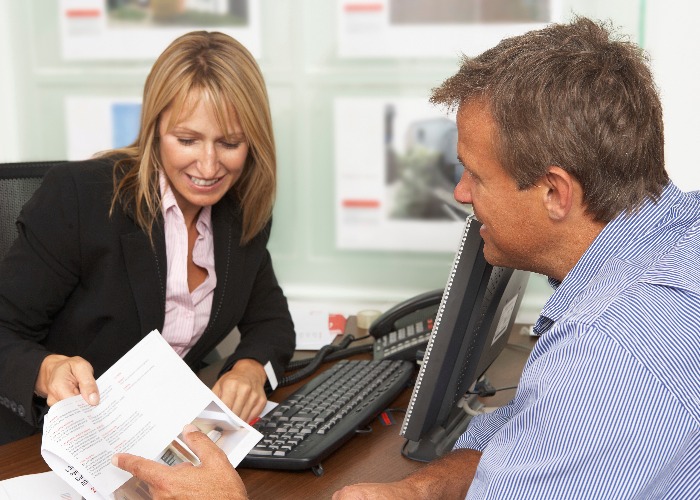Here are the questions you need to ask before renting a property

To make sure you aren't caught out as a new tenant, watch out for these rip-offs and scams.
Sections
Rent
It sounds obvious, but work out exactly how much rent you’ll be paying before you sign anything. When translating the weekly rental price into monthly costs, remind yourself that four weeks do not a calendar month make!
And make sure you know exactly how much rent is being demanded up front. Some landlords ask for three months’ worth (a friend was asked for a staggering six months) so always double check.
If the landlord is asking for more than a month’s rent, ask yourself why - a landlord with money troubles could go bankrupt and leave you homeless.
Remember, with everyone trying to let the houses they can’t sell, it’s currently a renter’s market. Be polite but firm and hammer down that rent!
Deposit
A deposit equivalent to more than two months’ rent should set alarm bells ringing, for the same reasons as above.
This aspect of renting has become less problematic in recent months, because the Tenancy Deposit Scheme (introduced in October 2007) now helps safeguard tenants’ rights.
In a nutshell, it makes it much harder for landlords to unfairly hold on to your deposit at the end of the tenancy. Read Top Tips For Successful Landlords to find out more about landlords’ responsibilities.
Administration fees
If an estate agent is involved, find out exactly how much you’ll be charged in ‘administration’ fees if you do decide to rent the property. Expect to pay around £100 per person (just to print a new contract off a computer - grrr).
If the fee is much higher than this - or if the service you’ve received has been poor - it’s definitely worth haggling.
Management fees
It’s also worth checking to see if any management fees will apply during your time as a tenant. This is particularly likely if you’re renting a flat in a large block.
These fees are generally meant to cover the upkeep of a building’s communal areas (hallways, communal gardens etc) but they vary widely. Get written specifics from the managing agent before you sign anything, so you know exactly where your money is meant to be going.
Holding fees
Find out how much you’ll be expected to pay as a holding fee, to be kept by the landlord/managing agent while they check your references.
Once you’ve signed the contract, this money should be returned to you - or your other payments should be reduced accordingly. Just make sure this is going to happen before you hand over the dosh!
By paying a holding fee, you’re effectively saying ‘yes, I want to rent this property and I’m not going to do a runner’. If you do change your mind afterwards, you won’t get a refund.
And make sure your references are accurate and complete. If you’re rejected for the property on the grounds of inadequate references, you probably won’t get the holding fee back.
Council Tax
You should work out exactly how much Council Tax you’ll be paying each year - it could even affect your choice of location. I moved to Wandsworth because the Council Tax there was half the price of most other London boroughs.
It’s also worth finding out what Council Tax band your potential property falls into. Generally speaking, the higher the value of the property, the higher the band, and the more you’ll have to pay.
Utility costs
When looking around, think utility costs. That period conversion may be the stuff of dreams, with its polished oak floorboards and original sash windows - but it will also be a bugger to heat.
Clarify what - if any - utilities are included in the rental price. Flats in big blocks, for example, sometimes come with water and even heating costs thrown in.
And to find out just how much energy you’re likely to use, make sure your potential landlord shows you an Energy Performance Certificate.
This will give details of the property's energy efficiency and environmental impact. Any landlord marketing a self-contained property to new tenants has to provide one.
Un/furnished
An unfurnished rental property is usually cheaper than its furnished equivalent. You can really make the place your own, and you won’t have to worry about something nasty crawling out of that yucky old mattress as you sleep…
On the other hand, a house-full of furniture could cost you an arm and a leg. One compromise is to find somewhere with white goods only (essentially a washing machine, oven and fridge/freezer).
If you do take the ‘unfurnished’ route, have a look at how you can furnish your home for less.
That nasty surprise
When you’re viewing each property, don’t let the landlord or estate agent rush you. Look round every room thoroughly and keep your eyes peeled for evidence of nasty surprises that might await you.
When my partner and I were viewing our current flat, I was chuffed to bits that the bathroom had just been re-painted. How white! How sparkling! As it turns out, how desperately they had tried to cover up all that mould.
I lost endless work days waiting for contractors who never turned up. And in the end - fed up with the whole business - I was the one shelling out for the sugar soap and rolling my sleeves up…
This is a classic lovemoney article
More on renting a property:
Tenants' rights and where to go for help
Tenants: how to get your deposit back
Comments
Be the first to comment
Do you want to comment on this article? You need to be signed in for this feature